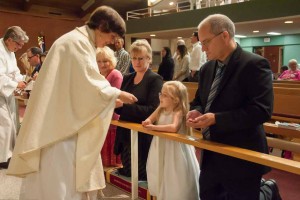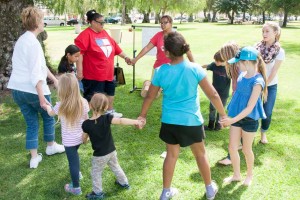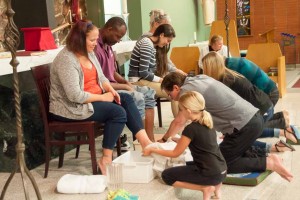 Community might be the most obvious description of any church. What church would boast of being a gathering of strangers? Family is the word people most often use to describe their church. The idea of community might not be revolutionary, but Trinity’s take on this concept could be. Let’s take a moment to consider what we do and don’t mean by #community.
Community might be the most obvious description of any church. What church would boast of being a gathering of strangers? Family is the word people most often use to describe their church. The idea of community might not be revolutionary, but Trinity’s take on this concept could be. Let’s take a moment to consider what we do and don’t mean by #community.
On a community Facebook page recently, someone requested recommendations for a local church for a young adult. “Preferably someplace with a lot of people his age,” the poster added. Facebook immediately exploded with answers, with each correspondent describing how his or her church had the best, most relevant options for young adults, all somewhere on the same theme of a hip worship service or Bible study meant just for that age group, never a single grey hair or wrinkle in sight. No one wondered why the best church option would be the most exclusive one.
Dr. Martin Luther King, Jr. said that Sunday morning is the most segregated hour of the week. This observation certainly applies to race, but also to age, politics, income level, and other social divisions. The problem is that Christians don’t seem to see this as a problem. Churches deliberately target their message to a particular demographic, confident that the marketing methods that have proved themselves in business will be equally successful in selling the Gospel. It works. We all like to be with people like us, and the church we choose looks like us. But does success make this a good or faithful idea?
certainly applies to race, but also to age, politics, income level, and other social divisions. The problem is that Christians don’t seem to see this as a problem. Churches deliberately target their message to a particular demographic, confident that the marketing methods that have proved themselves in business will be equally successful in selling the Gospel. It works. We all like to be with people like us, and the church we choose looks like us. But does success make this a good or faithful idea?
When King made this observation, obviously he did not mean it as a compliment. Division is part of church life, but we should not be ok with that. When Jesus called on his disciples to be “one, as I and the Father are one,” he wasn’t building a community of identical people. What we know of his followers tells us that they were a diverse lot. Jesus’ disciples included a Zealot, part of the active resistance against the Roman Empire, and a tax collector, a collaborator with the occupying force. He had a stable family man like Peter, along with Mary of Magdela who was healed of seven demons (Scripture says nothing of her marital status). His followers were widows with money and time to travel, wealthy homeowners, impoverished lepers, and even a few from the religious establishment. Continuing this trend, in his letters, St. Paul struggles to hold together congregations made up of rich and poor, slaves and owners, educated and illiterate. All these people have only one thing in common: Jesus.
 While divisions have always been part of church history, they are not the parts of history we hold up as examples for Godly living. The Gospel message of reconciliation can’t be real if we maintain the divisions that we are used to. The Church has always been meant to be a different sort of community.
While divisions have always been part of church history, they are not the parts of history we hold up as examples for Godly living. The Gospel message of reconciliation can’t be real if we maintain the divisions that we are used to. The Church has always been meant to be a different sort of community.
This is why inclusion isn’t optional at Trinity. While we do offer programs for particular age groups–Sunday School, young adults, etc., we always see the need to come together as one. Members of our congregation hold a variety of political opinions–just check our Facebook posts! People of different ages talk together, work together, and–most importantly–worship together. We need each other.
Obviously this is not easy. We all want to hang out with our own tribe. We are appalled to find out that the person we thought we had so much in common with voted for that candidate! But the point is that we have enough in common: We have Christ. Allowing Christ to bridge our differences means that we discover what is essential. There are essentials in the Christian faith (love, for example, that’s the one Jesus emphasizes). It isn’t a case of anything goes. But so often we set up the divisions by mistaking our opinions for those of God, forgetting that we don’t actually know the entire picture. Humility, understanding, new ideas–there are a lot of things to be gained from being part of a diverse community. But most of all it is a question of faith: if Christ’s love overcomes boundaries, why should we maintain them?
#community stands for this way of being church. So share your stories and (especially) pictures of Trinity: #choosetrinity #community.
#choosetrinity #community.
